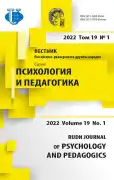Осознанность в межкультурной коммуникации: опыт качественного анализа
- Авторы: Ткаченко Н.В.1, Хухлаев О.Е.1
-
Учреждения:
- Московский государственный психолого-педагогический университет
- Выпуск: Том 19, № 1 (2022)
- Страницы: 110-127
- Раздел: ЛИЧНОСТЬ В МЕЖКУЛЬТУРНОЙ КОММУНИКАЦИИ
- URL: https://journal-vniispk.ru/2313-1683/article/view/326122
- DOI: https://doi.org/10.22363/2313-1683-2022-19-1-110-127
- ID: 326122
Цитировать
Полный текст
Аннотация
Межкультурная коммуникация в последнее время - одна из актуальных тем психологии межгрупповых отношений, межкультурной коммуникации и социальной психологии. Межкультурная коммуникация рассматривается в рамках теорий коммуникативистики и описывает особенности и механизмы, лежащие в основе эффективной коммуникации. Интегративная модель коммуникации, описанная авторами ранее, поставила необходимость проверить роль осознанности в межкультурной коммуникации. Цель исследования заключается в анализе вклада осознанности в ситуации межкультурного взаимодействия с помощью качественных методов исследования. Исследование проводилось с опорой на теоретическую модель межличностной осознанности, описанной на четырех уровнях: концентрация на настоящем, присутствие; внимательное осознавание одновременно и себя и другого; принятие другого без осуждения; сдерживание автоматических реакций. С помощью метода глубинного интервью и последующего тематического и феноменологического анализа данных получены описания механизма осознанности в межкультурном общении в целом и на каждом из четырех аналитических уровней в отдельности. В результате анализа получены данные, раскрывающие содержание каждого из уровней осознанности. Сделаны выводы о содержании целей и ценностей межкультурного общения, мотивов специфической практики в жизни и общении информантов. Проанализированы способы контроля реактивности в ситуации неопределенности межкультурного общения и описаны роли установок на принятие другого без осуждения. Полученные результаты могут послужить основой для развития интегративной модели, описывающей роль тревоги и неопределенности в межкультурном общении, и позволяют операционализировать данные в измерительные шкалы для количественных исследований в области оценки роли осознанности в межкультурном общении.
Об авторах
Наталья Владимировна Ткаченко
Московский государственный психолого-педагогический университет
Email: tkachenkonv@mgppu.ru
ORCID iD: 0000-0002-0315-8511
кандидат психологических наук, доцент кафедры этнопсихологии и психологических проблем поликультурного образования
Российская Федерация, 127051, Москва, ул. Сретенка, д. 29Олег Евгеньевич Хухлаев
Московский государственный психолого-педагогический университет
Автор, ответственный за переписку.
Email: huhlaevoe@mgppu.ru
ORCID iD: 0000-0002-4620-9534
кандидат психологических наук, заведующий кафедрой этнопсихологии и психологических проблем поликультурного образования
Российская Федерация, 127051, Москва, ул. Сретенка, д. 29Список литературы
- Brown, K.W., & Ryan, R.M. (2003). The benefits of being present: Mindfulness and its role in psychological well-being. Journal of Personality and Social Psychology, 84(4), 822–848. https://doi.org/10.1037/0022-3514.84.4.822
- Creswell, J.W. (1997). Qualitative inquiry and research design: Choosing among five traditions. Thousand Oaks, CA: Sage.
- Dekeyser, M., Raes, F., Leijssen, M., Leysen, S., & Dewulf, D. (2008). Mindfulness skills and interpersonal behaviour. Personality and Individual Differences, 44(5), 1235–1245.
- Dyakov, D.G., & Slonova, A.I. (2019). Mindfulness in the development of the cognitive sphere: Evaluation of the short-term effectiveness of the mindfulness-based cognitive therapy program. Counseling Psychology and Psychotherapy, 27(1), 30–47. (In Russ.) https://doi.org/10.17759/cpp.2019270103
- Fedunina, N.Yu., Vikhristyuk, O.V., & Bannikov, G.S. (2019). Mindfulness practices in the prevention of suicidal behavior in adolescents (a review of foreign studies). Moscow University Psychology Bulletin, (2), 121–144. https://doi.org/10.11621/vsp.2019.02.121
- Gudykunst, W.B. (1985). A model of uncertainty reduction in intercultural encounters. Journal of Language and Social Psychology, 4(2), 79–98. https://doi.org/10.1177/0261927X8500400201
- Gudykunst, W.B., & Nishida, T. (2001). Anxiety, uncertainty, and perceived effectiveness of communication across relationships and cultures. International Journal of Intercultural Relations, 25(1), 55–71. https://doi.org/10.1016/S0147-1767(00)00042-0
- Hammer, M.R., Wiseman, R.L., Rasmussen, J.L., & Bruschke, J.C. (1998). A test of anxiety/uncertainty management theory: The intercultural adaptation context. Communication Quarterly, 46(3), 309–326. https://doi.org/10.1080/01463379809370104
- Kabat-Zinn, J. (2003). Mindfulness-based interventions in context: Past, present, and future. Clinical Psychology: Science and Practice, 10(2), 144–156. https://doi.org/10.1093/clipsy/bpg016
- Khukhlaev, O.E. (2020). Integrative socio-psychological model for assessment and forecasting the effectiveness of intercultural interaction. Social Psychology and Society, 11(4), 26–41. (In Russ.) https://doi.org/10.17759/sps.2020110403
- Kvale, S. (2003). Issledovatel'skoe interv'yu. Moscow: Smysl Publ. (In Russ.)
- Melnikova, O.T., Krichevets, A.N., Gusev, A.N., Busygina, N.P., Khoroshilov, D.A., & Barskiy, F.I. (2014). Criteria for the evaluation of qualitative research. National Psychological Journal, (2), 49–51. (In Russ.) https://doi.org/10.11621/npj.2014.0206
- Neuliep, J.W. (2012) The relationship among intercultural communication apprehension, ethnocentrism, uncertainty reduction, and communication satisfaction during initial intercultural interaction: An extension of anxiety and uncertainty management (AUM) theory. Journal of Intercultural Communication Research, 41(1), 1–16. https://doi.org/10.1080/17475759.2011.623239
- Pugovkina, O.D., & Shilnikova, Z.N. (2014). The concept of mindfulness: Nonspecific factor of psychological wellbeing. Modern Foreign Psychology, (2), 18–28.
- Smith, J.A., & Osborn, M. (2007). Interpretative phenomenological analysis. In J.A. Smith (Ed.), Qualitative Psychology – a Practical Guide to Research Methods (pp. 53–80). London: Sage Publications.
- Starks, H., & Trinidad, S.B. (2007). Choose your method: A comparison of phenomenology, discourse analysis, and grounded theory. Qualitative Health Research, 17(10), 1372–1380. https://doi.org/10.1177/1049732307307031
- Stephan, W.G., Stephan, C.W., & Gudykunst, W.B. (1999). Anxiety in intergroup relations: A comparison of anxiety/uncertainty management theory and integrated threat theory. International Journal of Intercultural Relations, 23(4), 613–628. https://doi.org/10.1016/S0147-1767(99)00012-7
- Thomas, D.C. (2006). Domain and development of cultural intelligence: The importance of mindfulness. Group and Organization Management, 31(1), 78–99. https://doi.org/10.1177/1059601105275266
- Ting-Toomey, S. (2010). Mindfulness. Encyclopedia of Identity (pp. 455–458). Fullerton: Sage.
- Ting-Toomey, S. (2015). Mindfulness. J.M. Bennett (Ed.), The Sage Encyclopedia of Intercultural Competence (pp. 620–626). Fullerton: Sage.
- Ting-Toomey, S., & Dorjee, T. (2015). Intercultural and intergroup communication competence: Toward an integrative perspective. In A. Hannawa & B. Spitzberg (Ed.), Communication Competence (pp. 503–538). Berlin, München, Boston: De Gruyter Mouton. https://doi.org/10.1515/9783110317459-021
- Tkachenko, N.V., & Khukhlaev, O.E. (2021). An integrative model of intercultural interaction: A qualitative analysis experience. RUDN Journal of Psychology and Pedagogics, 18(3), 459–474. (In Russ.) https://doi.org/10.22363/2313-1683-2021-18-3-459-474
- Zelikson, D.I. (2016). The interrelation between mindfulness and subjective wellbeing. Journal of Modern Foreign Psychology, 5(3), 92–99. (In Russ.) https://doi.org/10.17759/jmfp.201605011
Дополнительные файлы









